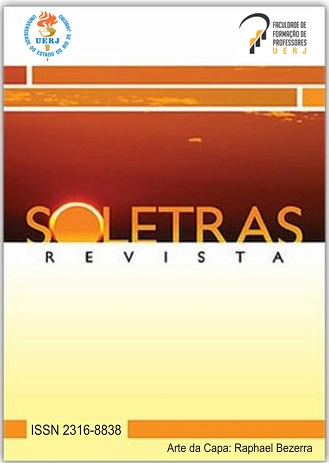Decolonizar as diretrizes curriculares e educacionais: repensando o ensino de Língua Portuguesa como Segunda Língua para pessoas surdas
DOI:
https://doi.org/10.12957/soletras.2024.82938Resumo
Neste artigo, trazemos à discussão limites e possibilidades enfrentadas pela comunidade surda, em virtude dos modos de implementação de políticas linguísticas já existentes, como formação de professores em língua portuguesa escrita como segunda língua, inserção da Libras como disciplina e as questões curriculares a elas ligadas. Como aporte teórico, recorremos aos conceitos de cidadania linguística e de colonialidade, por oferecerem uma crítica profunda às estruturas de poder e conhecimento herdadas do colonialismo, ao desafiar narrativas dominantes e propor uma reavaliação das práticas pedagógicas e políticas linguísticas. No percurso metodológico adotado, refletimos sobre a urgência de práticas decoloniais em prol da formação de cidadãos críticos, que tenham a sua cidadania linguística reconhecida, bem como a formulação de currículos de língua portuguesa na perspectiva de segunda língua, a fim de contribuir para a construção de espaços de aprendizagem mais democráticos. Como encaminhamento e a fim de contribuir com práticas educativas para alunos surdos do ensino superior, apresentamos um relato de experiência vinculado às propostas apresentadas para a formação de professores surdos, nas quais a visão decolonial, a expansão do conhecimento de mundo e dos sentidos a este atribuídos pelos discentes são os elementos centrais, em aulas que se desejam interculturais.
Downloads
Publicado
Edição
Seção
Licença
A aprovação dos artigos implica a cessão imediata e sem ônus dos direitos de publicação nesta revista. O(s) autor(es) autoriza(m) ao Programa de Pós-graduação em Letras e Linguística (PPLIN) a reproduzi-lo e publicá-lo na revista SOLETRAS, entendendo-se os termos “reprodução” e “publicação” conforme definição do artigo 5° da Lei 9610/98. O(s) autor(es) continuará(rão) a ter os direitos autorais para publicações posteriores. O artigo poderá ser acessado pela rede mundial de computadores (http://www.e-publicacoes.uerj.br/index.php/soletras), sendo permitidas, a título gratuito, a consulta e a reprodução de exemplar do artigo para uso próprio de quem o consulta. Casos de plágio ou quaisquer ilegalidades nos textos apresentados são de inteira responsabilidade de seus autores.



